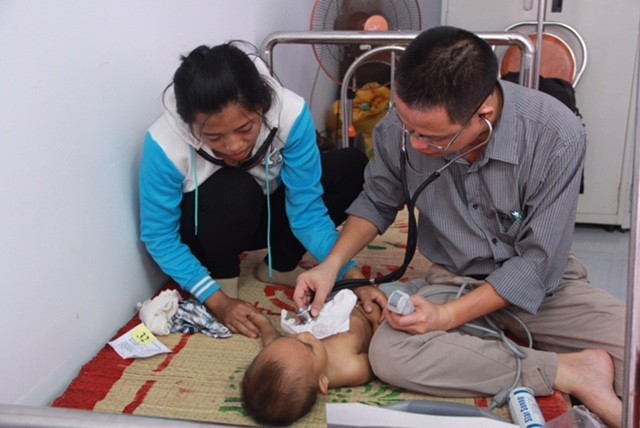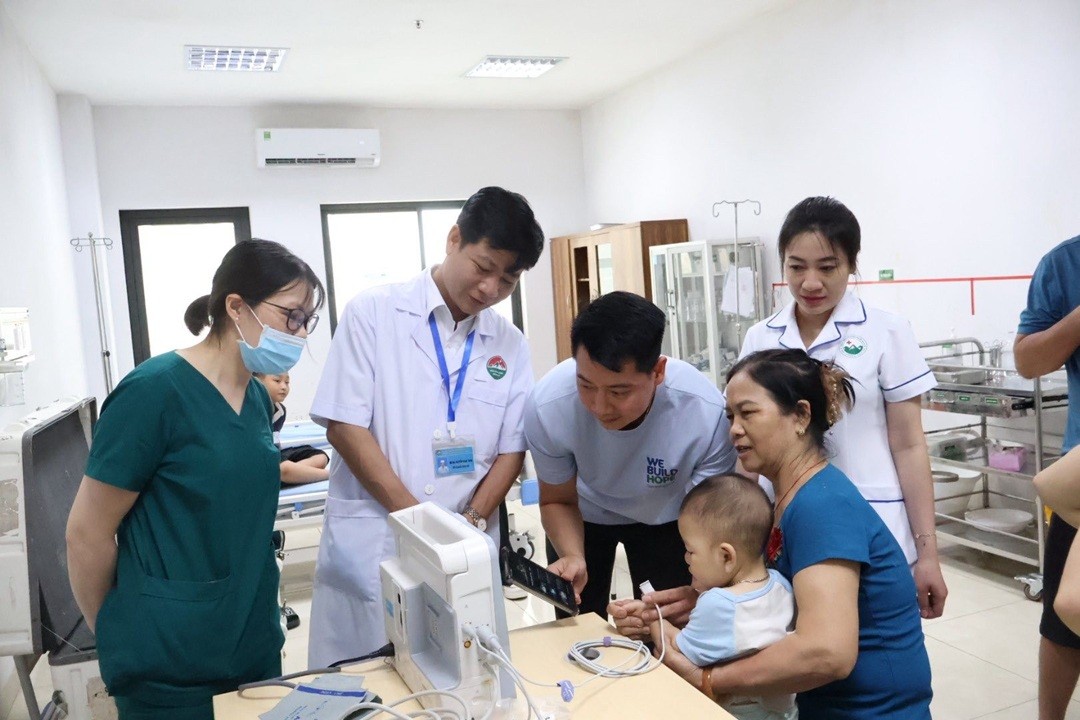Vietnam Raising Awareness for Safe Motherhood for Ethnic Minorities
 |
| Illustrative image. Photo: VNA |
Vietnam has made significant progress in improving sexual and reproductive health of the general population in the past 20 years and was one of the only six countries in the world, which achieved, in 2015, the Millennium Development Goal 5 (MDG5) on the reduction of maternal mortality. However, disparities and inequalities remain in access to and utilization of sexual and reproductive health services among different ethnicities and regions.
Only 11% of the ethnic minority mothers in 60 communes of the most disadvantaged provinces, namely Bac Kan, Lai Chau, Son La, Dak Nong, Kon Tum and Gia Lai receive antenatal care at least four times, which is the minimum requirement. The percentage of mothers delivered in health facilities is extremely low at about 30%.
These are among the important results of a study conducted for the project "Leaving no one behind: Innovative interventions to reduce maternal mortality in the ethnic minority region in Vietnam”, which is funded by MSD for Mothers and MSD Vietnam in the amount of USD 1.2 million and UNFPA USD 810,000, in collaboration with the Health Ministry.
The project is one of the most important initiatives of UNFPA Vietnam to reduce maternal mortality among ethnic minorities in six provinces through innovative interventions, paying close attention to special needs of ethnic minority women who are at risk of being left behind in the country’s sustainable development process.
Under the framework of this project, women, especially pregnant women in 60 most remote ethnic minority communes of six most disadvantaged provinces, namely Bac Kan, Lai Chau, Son La, Dak Nong, Kon Tum and Gia Lai will benefit from innovative interventions to prevent maternal deaths.
60 target ethnic minority communes are located in remote and hard-to-reach geographical locations and belong to the extremely poor socio-economic situation with a high rate of home-based deliveries. The local commune health stations are facing a lack of basic services and tests for maternal care as well as essential equipment for antenatal care and delivery. Such limited capacities make it difficult for healthcare facilities to manage maternal complications causing high maternal mortality.
To achieve the project’s objectives, a survey was conducted by researchers from the Hanoi University of Public Health in these 60 ethnic minority communes. Using different methods, the survey identified the needs to train local health providers and introduce behavior change communication and community mobilization strategies. Such programmatic interventions are to ensure Safe Motherhood of pregnant women, taking into account of local tradition and socio-cultural practices.
 |
| At the dissemination workshop on findings and recommendations of the MSD4 Mothers supported project on innovative interventions to reduce maternal mortality in ethnic minority groups. |
According to the study, only 11% of the ethnic minority mothers in these target communes received antenatal care at least 4 times. The percentage of mothers delivered in health facilities is about 30%, that is far lower than the national average of 96%.
In terms of family planning, only 53% of mothers in these locations use contraceptives (against national average of 72% usage, meaning 19 percent points lower), and unmet need for family planning is estimated at 18% (against the national average of 10%, nearly two times higher).
Particularly, for H’mong women, the rate of contraceptive use is only 41% and unmet need for family planning, 21%; for Thai women, these rates are 39% and 49% respectively.
The percentage of ethnic minority women reporting autonomy in using health services was 86%, in having sexual intercourse, 70% and in using contraceptive methods, 86%.
The overall percentage of ethnic minority women reporting bodily autonomy in all three above-mentioned aspects was only 61%.
Among other findings, the study also indicates the need for training district and communal health workers on emergency obstetric care during pregnancy and delivery. It also indicates that ethnic minority mothers and their family members are not fully aware of the importance of maternal care, especially danger signs during the pregnancy and child delivery, as well as the importance of deliveries in health facility. This can be attributable to cultural factors, and the study recommends the introduction of culturally sensitive health education to local communities.
 |
| UNFPA Representative for Vietnam, Naomi Kitahara, personally observed the vulnerability of ethnic minority communes when it comes to sexual and reproductive health during my field trip to Lai Chau province last year, which is one of the six participating provinces of this project. |
Speaking at the workshop in Hanoi to discuss the results of the study, UNFPA Representative for Vietnam, Naomi Kitahara, said that from her visit to Lai Chau last year, she observed the vulnerability of the ethnic minority communes when it comes to sexual and reproductive health.
Kitahara stressed that the findings of the study constitute good evidence for the development of innovative interventions in order to ensure the provision of quality sexual and reproductive health services to prevent women from dying from pregnancy and childbirth, thus contributing to Vietnam’s efforts to achieve the SDG target on maternal mortality by 2030.
Dinh Anh Tuan, Deputy Director of the Maternal and Child Health Department, Ministry of Health also shared his views with Kitahara on the results of the study.
He added: “Reducing maternal mortality amongst ethnic minorities is a top priority of the government’s development agenda. The findings of the study will help the Ministry of Health and provincial departments of health to develop its evidence-based policies and implementation plans, which are effectively responding to actual needs of ethnic minority women and their families to ensure that every delivery is safe. Lessons learned from this project will help the ministry to accomplish the national action plan on maternal, neonatal and child health for period 2021-2025 with vision towards 2030 to achieve SDG targets on health care”.
 | Experts Say India Will Soon Become World's 3rd Largest Economy PM Modi said that experts have stated that the growth witnessed by the country after 1990, in the past three decades, will happen in just ... |
 | Bright Spots of Local Peace Committees Across Vietnam The activities carried out by Peace Committees in Hanoi, Hai Phong, Da Nang and Ho Chi Minh City have significantly contributed to people-to-people diplomacy in ... |
 | World Population Hits 8 Billion Today As the world’s population hits 8 billion people, UNFPA calls for solidarity in building a better and stronger world where everyone can have an enjoyable ... |
Recommended
 Viet's Home
Viet's Home
Lai Chau National Assembly, People's Council Delegates Hold Dialogue with Children
 Viet's Home
Viet's Home
24 Children with Disabilities in Northern Provinces Received Free Surgery
 Viet's Home
Viet's Home
World Vision Promotes Comprehensive Nutritional Care for Vietnamese Children
 Viet's Home
Viet's Home
Hanoi, South Africa Strengthens People-to-people Exchanges, Expands Multi-sector Cooperation
Popular article
 Viet's Home
Viet's Home
Hue City to Raise Awareness on Mine Accident Prevention
 Focus
Focus
Vietnam Leaves Imprints on the World Peacekeeping Map
 Viet's Home
Viet's Home
“Global Vietnamese Singing 2025” - Connecting Hearts Longing for Homeland
 Viet's Home
Viet's Home







